|
This coming Sunday, to close out the Easter Octave, we will celebrate Divine Mercy Sunday. Devotion to Divine Mercy started with St. Faustina in the early 1900s and Divine Mercy Sunday became officially recognized by Pope John Paul II in 2000 along with the canonization of St. Faustina. Growing up, I would hear a homily about the image of Divine Mercy every Divine Mercy Sunday, but it wasn’t until I was introduced to the Divine Mercy Chaplet that I began to understand more about the overall message of Divine Mercy.
The Chaplet of Divine Mercy is a devotion that was started by St. Faustina from her visions of Jesus. It is a series of prayers that can be said on rosary beads, albeit usually much quicker than a rosary, that is especially connected to Divine Mercy Sunday. What particularly strikes me about the Divine Mercy Chaplet is how many of the prayers end with “us and the whole world.” Both the Eternal Father prayer, the prayer said on the “Our Father” beads, and the prayer said on each of the “Hail Mary” beads ends with this emphasis on “us and the whole world.” I began to understand what Divine Mercy meant when I thought about mercy not just in terms of myself, but about the whole world, both my closest friends and people I had never met. The message of Divine Mercy is that through the mercy Jesus shows us, we are called to be merciful and in harmony with all of our brothers and sisters throughout the world. Our inward journey of mercy ultimately leads us outward to living a merciful life. For me, I am reminded of the Beatitudes and the call for everyone to be merciful, peacemakers, and more (Matthew 5:3-12). However, I have found myself struggling with how I, a college student, can live out this mercy to the “whole world.” How can I show mercy to the “whole world” during the COVID-19 pandemic when we cannot travel? These are some of the questions I find myself grappling with when thinking about how to live out a life of Divine Mercy. When I think about Divine Mercy, I think about God’s abundant love for us and how we are called to share that love with all our brothers and sisters. In that, I mainly think about community service opportunities I have had while in college to go on both service and justice immersion trips around the country, as well as locally in Washington, DC. But I also thought about doing little acts of service throughout the day. I think just as we can do little acts of service throughout the day, we can do little acts of mercy to spread a consistent ethos of mercy. As Mother Teresa is attributed with saying, “we cannot all do great things. But we can do small things with great love.” In my daily life, I have learned that there are many ways that we can treat people with mercy and love, bringing the ethos of Divine Mercy to our daily lives. A lot of this includes little things, such as: not getting upset when the cafeteria food takes twice as long as normal to be made, receiving and giving criticism in group projects and assignments with love rather than having an attitude of superiority, and being adaptable and understanding when situations change, especially with COVID-19. Over the years I have seen some commercials advertising “pass it on” campaigns in terms of good deeds, but I think that idea also applies to living in a merciful and loving way. Our mercy spreads to the “whole world” through us being merciful to someone who is in turn merciful to many more people. As we approach and celebrate this Divine Mercy Sunday, let us think about ways that we can live a life of Divine Mercy every day. “Extend your mercy towards others, so that there can be no one in need whom you meet without helping. For what hope is there for us if God should withdraw His Mercy from us?” – Saint Vincent de Paul (attributed) To learn more about the corporal and spiritual works of mercy, please click here.
0 Comments
We may be well-acquainted with Lenten practices and devotions such as giving something up, abstaining from meat, or praying the Stations of the Cross. It can be more difficult, however, to name ways to observe the Easter season.
Yet in the Preface of the Eucharistic Prayer at every Mass during the Easter season, we hear: “It is truly right and just, our duty and our salvation, at all times to acclaim you, O Lord, but in this time above all to laud you yet more gloriously, when Christ our Passover has been sacrificed… Therefore, overcome with paschal joy, every land, every people exults in your praise and even the heavenly Powers, with the angelic hosts, sing together the unending hymn of your glory…”[1] What is “paschal joy” and how do we praise the Lord “more gloriously” in the Easter season? It is unreasonable to expect anyone to will themselves to be happy at any given moment, much less for an entire season. But joy is not the same as happiness, nor is it the absence of sadness. Joy is a fruit of charity. It flows out of love; it results from a participation in goodness. We feel joy in the presence of someone or something we love; we rejoice in the well-being of our loved ones. If our Lenten observance is focused on charity—particularly acts of charity such as prayer, fasting, and almsgiving—then joy flows naturally from them. The disciplines that turn our gaze outward to God and neighbor, the sacrifices we make, are all a participation in goodness, an act of love. Paschal (Easter) joy, then, can be seen as the fruit of our Lenten journey. Our Lenten efforts are not meant to be temporary measures. They are intended to effect lasting change in us, to conform us more profoundly to our Lord who died but has been raised. What can we do then, so that we don’t simply drop our Lenten observance now that Easter has arrived? How can we instead allow these observances to take root in such a way that they enable us to celebrate the Easter season more fully and joyfully? Consider one or more of the following suggestions to cultivate paschal joy and fill each of the fifty days of the season with festivities and devotions:
Click here for more resources to accompany you this Easter season. [1] Preface I-V of Easter, Roman Missal, Third Typical Edition. [2] Directory on Popular Piety and the Liturgy, no. 150, no. 152. [3] Directory on Popular Piety and the Liturgy, no. 153. [4] Directory on Popular Piety and the Liturgy, no. 154. [5] Directory on Popular Piety and the Liturgy, no. 155. [6] Cf John Paul II, General Audience, Wednesday, 30 May 1979 “When I saw the kindness of Jesus, I began to beg His blessing. Immediately Jesus said, For your sake I bless the entire country. And He made a big sign of the cross over our country. Seeing the goodness of God, a great joy filled my soul.” - The Diary of St. Faustina, entry 39 October 5th is the feast day of one of Poland’s great saints: St. Maria Faustina Kowalska. Along with many others, I proudly claim that St. Faustina became my favorite saint after I was introduced to her Diary. Little did I know that this spiritual masterpiece would lead me to fall in love not only with her and the Divine Mercy message, but also with the culture, language, history, and Catholicity of Poland. Since opening Faustina’s Diary for the first time in 2015, I have traveled to Poland twice and learned about other great Polish Catholics such as Blessed Jerzy Popieluszko, Blessed Michal Sopocko, and Cardinal Stefan Wyszyński. I’ve gone deeper into the teachings of Pope St. John Paul II and learned about his own devotion to St. Jadwiga, read about the Polish Solidarity Movement and its leader, Lech Walesa, and much more. I’ve often felt that Poland has its own brand of “Catholic.” There’s the Eastern Rite Catholics, Latin Catholics, and then the Polish Catholics. In the 20th century alone, countless Polish saints have risen from the ashes of two world wars to shine lights of hope, mercy, justice, and love into the world. From its mystics and martyrs to its heroic and internationally beloved pontiff John Paul II, Poland is steeped in Catholicism. You can almost taste it in the air when you hop off the plane at John Paul II Kraków-Balice International Airport or walk the grounds of the Divine Mercy Shrine in Łagiewniki. I strongly hope that future generations treasure Poland’s rich history and the giants that paved the way for them to explore the faith in an incredibly deep and profound way, given the intense historic time periods through which their faith blossomed. Recently, I had a conversation with a friend’s young Polish au pair that made me wonder if this generation does not recognize the gems earned for them by their spiritual ancestors. As I tend to do when meeting anyone from Poland, I rattled off to this young woman about all of my favorite Polish places, saints, and historical moments. She found my love for Poland surprising, and talked about how many young Poles are trying to come to the United States. This puzzled me. Understandably, a country’s own citizens are its biggest critics for a variety of legitimate reasons. But as fellow Catholics, I was hoping for a sense of pride, a recognition of the depth of their history and faith. Maybe, like our country and so many others, appreciation for heritage fades with each passing generation. Indeed, today’s Poles are further removed from the wounds of war and communism than their ancestors, and thus it becomes easy to forget what was fought and won before them. As a result of my time spent in Poland and my subsequent research, I’ve come to admire that it is a place where national culture, identity, and faith was suppressed—unsuccessfully—over and over for centuries. It is a place whose heritage was preserved with blood, zeal, and grit. A place where Catholicism wasn’t freely available but had to be searched for underground and practiced in secret. Poland had to earn where it is today, and past generations understood the price of defending this heritage. Today, when you walk into a church in Poland, you will see a handful of priests hearing confessions before Mass. You will hear beautiful hymns sung—not with heads down buried in the missals, but eyes forward, sung by heart, and with pride. You will hear piercing silence during the consecration of the Sacred Host. You will find standing room only during Mass. You will not be able to find an open store or restaurant two days leading up to Easter. As an American living in a largely secular society, these observations were refreshing to me. Ultimately, Poland’s historical example of turning suffering into mercy, justice, and love has much to teach us not only about the value of a life well lived, but about the value of misfortune well-suffered. From the surrender of St. Faustina, an uneducated peasant turned mystic-nun who penned one of our faith’s greatest spiritual works, to the small, frail priest and martyr Blessed Jerzy Popiełuszko boldly, bravely, and publicly proclaiming the truth of Christ directly in the face of communist rule, to the quarry worker and poet-turned Pontiff St. John Paul II, and everyone in between, the saints of Poland show us how we can “shine truth through misfortune,” as Fyodor Dostoevsky once wrote. Every one of the saints mentioned here overcame significant suffering, but through their surrender to Christ, became who they were meant to be, and “set the world on fire.” (St. Catherine of Siena). May you have a happy Feast Day! And if you haven’t, I invite you to open up St. Faustina’s Diary. You’ll be glad you did! In October, my husband and I welcomed a little boy. Our son is a master napper—and his favorite place to nap is most definitely in his parents’ arms. He has a way of passing out with his mouth wide open (a trait of my side of the family) and arms sort of flailed. Since he was born, and more recently, our 6-month-old has been teaching me about trust. When Benjamin is passed out in my arms and begins to stir in his sleep, he opens his mouth in a quivering “O” manner, as if to say, “Put my pacifier back in my mouth, please.” He does not open his eyes. He does not make a noise. It is a simple gesture. He has a desire for his pacifier to be back in his mouth, and trusts that I will, in fact, return the fallen pacifier. He trusts that he is loved, that he is provided for. He does not even need to wake up—he stays in a state of rest despite his request. This image of my son, asking to be cared for and trusting that I will fulfill his needs, makes me think of the prayer at the bottom of the Divine Mercy Image: Jesus I Trust in You. The message of Divine Mercy was given to St. Faustina, a Polish nun. Through revelation and prayer, Jesus communicated to St. Faustina the need for the whole world to understand His love and goodness as evidenced by one of his greatest attributes: mercy. This understanding begs us to trust that His mercies are bigger than our sin, and ultimately, that we are summoned to trust in the love and mercy that the Lord has for us. Jesus says to Faustina and she records in her diary, “‘I am love and Mercy Itself…The soul that trusts in My mercy is most fortunate, because I Myself take care of it.’” (1273) Benjamin’s trust in my love is the personification of belief in Divine Mercy. We are called to radically trust in Our Lord’s mercy and love in the same childlike way that Benjamin trusts me without any sign of doubt. The Divine Mercy message, to which the Church calls the faithful, is to accept our role as children—to have the faith that He will give us what we need. We too must trust in the goodness of Our Father to give us what we need. Is my trust as radical as my son’s? Am I able to completely rest knowing that our Lord desires to shower His grace and mercy upon me? Do I ask for His graces, trusting that He wants my good? On this Divine Mercy Sunday, ask yourself if you believe in the goodness of the Father. Ask for His grace for more trust in His mercy. Ask for more mercy! Reflect on the trust of children as they live in trust, knowing their parents will fulfill their every need. This Easter season, how can we become more childlike and embrace the message of Divine Mercy? Eternal God, in whom mercy is endless and the treasury of compassion — inexhaustible, look kindly upon us and increase Your mercy in us, that in difficult moments we might not despair nor become despondent, but with great confidence submit ourselves to Your holy will, which is Love and Mercy itself. -Closing prayer of the Divine Mercy Chaplet The Latin word for mercy is misericordia, which is formed from two other Latin words: “miseriae,” which means misery or suffering, and “cordia,” which means heart. One could thus say that the mercy of God draws misery out of a person’s heart. It is of the nature of mercy to therefore heal wounds. The mercy we are speaking about here is broader than the reception of forgiveness from God and granting forgiveness to others. It includes all of the spiritual and corporal works of mercy, which are also aspects of God’s very own love for us. As Pope St. John Paul II once said, “Mercy is love’s second name.” However, in this brief post, I’m going to focus on that aspect of mercy we are the most familiar with – forgiving and receiving forgiveness. I am an adult child of divorce, so I have seen first-hand what the lack of forgiveness can look like. I believe that divorce typically involves one or both parents withholding mercy. There are, of course, other complicating factors for the divorce, but I believe there is usually a failure of mercy somewhere in the relationship. I knew I did not want to repeat the mistakes of my parents, so I took a long look at mercy and examined how it might be a key to love and to healing wounds. In terms of love, I have always been struck by the beautiful reality that Matthew 19, which is Christ’s strongest teaching about the indissolubility of marital love, is preceded by one of Christ’s strongest teachings on mercy in Matthew 18, where he exhorts his followers to forgive 77 x 7 times. This number is a symbolic way for saying, “infinitely and unconditionally.” The proximity of these two teachings in the Bible suggests that the form of indissolubility is merciful love. Merciful love is not optional in relationships, but the foundation for its long-term success. Offering forgiveness gives a new beginning to the one who offends and helps relationships build from injuries that inevitably arise in any relationship, even great ones. As Ruth Graham, the wife of the recently deceased protestant minister Billy Graham said, “Marriage is a union of two good forgivers.” To offer forgiveness in the radical sense Christ is proposing here, we need to experience Divine Mercy ourselves. We can do this by going frequently to the Sacrament of Reconciliation and understanding what is occurring. In the Sacrament of Reconciliation, we receive unmerited forgiveness from Christ. He does not owe us forgiveness and yet he forgives. He also always forgives us despite the number of times we repeatedly fail at the same sin. “Christ never tires of mercy,” Pope Francis reminds us. And Christ forgave us while we were sinners before we were even repentant and able to receive that forgiveness. His cry on the Cross, “Father forgive them, for they know not what they do,” is echoed down through the centuries. When we experience this unmerited forgiveness in the Sacrament of Reconciliation, we are healed because we recognize that Christ loves us “just because.” He does not love us because we do not have sin, failures, or weaknesses. He loves us despite these things and the ugliness of our actions. He loves us “just because” we are always His beloved. Of course, Christ wants us to be repentant, to promise to be holy and sin no more, in order to be reconciled with Him and others. Yet at the same time, we must never forget that this divine forgiving love always remains unmerited because Christ loves unconditionally. With the reception of this Divine Mercy, we can then live mercifully in our own relationships in the same way and not be afraid when we or our spouse, friends, or family make mistakes, have conflict, or sin. These things happen; we are not perfect. In such moments, it is always possible to forgive, to receive forgiveness, and to love if we draw continually upon God’s grace and forgiveness. By doing so, we’ll experience healing and a deeper unity again and again through mercy. Questions for Reflection: When was the last time you received the Sacrament of Reconciliation? How have you experienced God’s mercy? This Sunday the Church celebrates the Feast of Divine Mercy, a fairly new feast day in the Church. Pope St. John Paul II, who declared Divine Mercy Sunday formally in 2000, stated that, “This [day] is the Easter gift that the Church receives from the risen Christ and offers to humanity.” I never understood that phrase more than when I went on pilgrimage to Poland. In the summer of 2016, I had the privilege of going to Krakow for World Youth Day. The pilgrimage was filled with many graces that I am still unpacking today. 2016 was declared an Extraordinary Jubilee Year of Mercy by Pope Francis, and World Youth Day was held in the country where the Divine Mercy devotion was birthed. Mercy and grace surely abounded that year. Early in the trip, we experienced a day that weighed heavy on our hearts. Our group leader announced that we would make a morning trip to the Auschwitz-Birkenau Concentration Camp Memorial and Museum. As a group we made the decision that, as a sign of respect for the more than one million people who lost their lives at that dark place, we would not speak while we were on the grounds. The silent walk through the memorial shook me to the core. The sadness was hard to comprehend, and the absence of God felt real. As we were nearing the end of the memorial, we came upon a tablet that read the same quote in different languages from all over the world. The quote began like this, “Forever let this place be a cry of despair and a warning to humanity…” That was my experience of the memorial: a cry of despair. After we returned to the bus, we departed for the Sanctuary of the Divine Mercy, where St. Maria Faustina Kowalska lived and is now buried. A basilica has been built as a shrine for Divine Mercy at the Sanctuary and was named “the Capitol of the Divine Mercy devotion” by St. John Paul II. The juxtaposition between Auschwitz-Birkenau and the Divine Mercy Shrine were too extreme for my heart. I was unprepared for the transition from a witness of utter despair to complete hope. Still in agony over our morning visit, I waited in line to get into the chapel where St. Faustina was laid to rest. In the chapel, Adoration of the Blessed Sacrament was also taking place. I was apprehensive to sit in the quiet with Our Lord and at the same time ready for some answers from Him. I walked into the chapel and received my answer from a familiar image hanging inside. In the chapel where St. Faustina is buried was a huge image that seemed to be made exactly for my desolate heart: the image of Divine Mercy; the image which came to St. Faustina in an apparition. It displays Christ in his glory blessing the world with one hand and touching his heart with the other. Two large rays beam out from his heart: one red and one white. There was Jesus with His open hands and open heart, summoning me. Jesus looked as if He was walking towards me, coming to me with His merciful love. The rays of red and white, representing the blood and water that come from His wounds, revealed His heart that desires to reach all of His children and reached me in that moment. Flowing from the heart of Jesus was the hope that was seemingly lost at Auschwitz and in the hearts of millions during WWII. For me, this was the answer to despair. At that moment I realized that although I have never experienced—and could never fathom—the suffering within the walls of that concentration camp, I could see that Christ’s mercy triumphs over all despair. It was triumphant during His perfect sacrifice on the Cross, and three days later at His Resurrection. Christ’s mercy does not hesitate to pierce our hearts, especially during times of suffering or despair in our lives. He only asks us to trust in that perfect mercy. Jesus asked St. Faustina to share with the leaders of the Church his desire that the first Sunday after Easter be declared and celebrated as the Feast of Mercy. It is no coincidence that St. Faustina died less than one year prior to the Nazi invasion of Poland. Perhaps Jesus appeared to her when He did because he anticipated the great need for mercy to flow over the world. Christ knows us, and longs to let His love and mercy pierce our hearts. He only asks us to trust in His sacrifice, His love, and His desire to know us and to be known by us deeply and intimately. When Christ revealed the image of Divine Mercy to Faustina, He asked for the image to be inscribed with three words: “Jezu, ufam Tobie” – “Jesus, I Trust in You.” As we celebrate the Feast of Divine Mercy this Sunday, let us trust in His infinite mercy and in His infinite love. Question for Reflection: How do you see God’s mercy alive in Scripture, history, or everyday life? To learn more about the Jubilee Year of Mercy, please click here. Today we celebrate the fifth anniversary of Pope Francis’ pontificate. In these short years, Pope Francis has done much to continue the work of his predecessors in building a culture of evangelization and inviting each member of the Church to live out their baptismal call as missionary disciples. Several important Church documents have been released throughout his papacy, including Evangelii Gaudium, the Apostolic Exhortation on the Proclamation of the Gospel in Today’s World, Laudato Si’, the encyclical on Care for our Common Home, and Amoris Laetitia, a post-synodal Apostolic Exhortation on Love in the Family. Pope Francis has participated in two World Youth Days, made roughly 22 international apostolic visits, and has canonized 885 saints. He called for the Jubilee Year of Mercy from 2015-2016. I would like to celebrate the fifth anniversary of his election by sharing some quotes that characterize his papacy and capture its tone.
1. A Church on Mission "I prefer a Church which is bruised, hurting and dirty because it has been out on the streets, rather than a Church which is unhealthy from being confined and from clinging to its own security… More than by fear of going astray, my hope is that we will be moved by the fear of remaining shut up within structures which give us a false sense of security, within rules which make us harsh judges, within habits which make us feel safe, while at our door people are starving. -Evangelii Gaudium, 49 Pope Francis envisions a missionary church—one with open doors to welcome people in, but also for each of us to step out and bring the Good News of Jesus Christ to the world. As Christians, it can be tempting to remain within the safety of our parish and Church community. However, Jesus calls us to “go out to the nations” and encounter the hurting world. Pope Francis reminds us of this evangelizing spirit entrusted to us by Jesus Christ and challenges us to be a Church on mission. 2. The Inherent Dignity of Mankind and Creation “Our insistence that each human being is an image of God should not make us overlook the fact that each creature has its own purpose. None is superfluous. The entire material universe speaks of God’s love, his boundless affection for us. Soil, water, mountains: everything is, as it were, a caress of God.” -Laudato Si, 84 About two years into his papacy, Pope Francis released his encyclical Laudato Si’, focusing on our responsibility as stewards of creation. No other pope has dedicated an entire encyclical to the care of creation. In doing so, Pope Francis reminds us that all of the created world helps us to glimpse and better know God Himself. Mankind is the pinnacle of creation, made in God’s image and likeness. In Laudato Si’, Pope Francis reminds us of each person’s inherent dignity, made with his or her own purpose, gifts, and mission. 3. The Transformative Power of Christ’s Love “Jesus’ love goes before us, his look anticipates our needs. He can see beyond appearances, beyond sin, beyond failures and unworthiness…He sees beyond this, to our dignity as sons and daughters, a dignity at times sullied by sin, but one which endures in the depth of our soul. He came precisely to seek out all those who feel unworthy of God, unworthy of others.” – Homily at Plaza de la Revolución during his Apostolic Journey to Cuba At the heart of the Christian life is an encounter with Jesus Christ. His love is transformative, life-changing. We encounter Christ in prayer, the sacraments, the parish, in one another. However, we cannot overestimate the importance of our prayer life—of moments throughout each day in which we enter into dialogue with God, offer up our work and sacrifices, remember the needs of others, or give God praise. When we carve out time each day for prayer, we are better able to know the look of Christ that goes beyond the worldly way of seeing things into our dignity as sons and daughters of God. 4. The Role of the Church in the Christian Life "We cannot understand Christ without his Church, just as we cannot understand the Church without her spouse, Christ Jesus, who gave his life out of love, and who makes us see that it is worth the price.” -Prayer Vigil for the Festival of Families in Philadelphia I love this quote because it sums up the relationship between Christ and His Church. We cannot know Christ apart from the Church, just as the Church cannot exist without Christ. Christ founded the Church in order to be a place of encounter with Him through the sacraments and through one another. We come to more fully know the love of God in the life of each parish. How can we create communities of encounter in our various parishes? Is the light of Christ truly shining forth in our communities? 5. The Messiness and Joy of Family Life “I thank God that many families, which are far from considering themselves perfect, live in love, fulfill their calling and keep moving forward, even if they fall many times along the way. The Synod’s reflections show us that there is no stereotype of the ideal family, but rather a challenging mosaic made up of many different realities, with all their joys, hopes and problems.” -Amoris Laetitia, 57 Pope Francis speaks realistically of human life and love. The family, the domestic church, is not perfect. We are called to learn and grow in love throughout our entire lives, just as we are called to learn and grow in holiness. The family is the place where love is mastered and refined. It is the foundation of society and of the Church. Pope Francis calls families to journey joyfully on the path of love. He invites us not to fear our imperfection, but to keep moving forward in hope and joy. 6. Not Letting Fear Impact Vocational Discernment “The work of discernment identifies our fears and can then help us to overcome them, opening us to life and helping us to calmly face the challenges that come our way. For us Christians in particular, fear must never have the last word but rather should be an occasion to make an act of faith in God… and in life!” -Message for World Youth Day Panama In preparation for the 2018 Synod on Young People, the Faith and Vocational Discernment and World Youth Day 2019 in Panama, Pope Francis spoke of the process of discernment, especially for young people today. Fear is often at the heart of our actions—or inaction. Christians, however, have no cause for fear. As we discern God’s call for our life each day, let us place our trust in Him and act with courage and boldness. God has created us for a unique mission that only we can fulfill in His Church. Let us discern his will for us, as Pope Francis encourages, “trusting that he will lead us to a good end.” 7. The Importance of Contemplating and Encountering God’s Mercy “We need constantly to contemplate the mystery of mercy. It is a wellspring of joy, serenity, and peace. Our salvation depends on it.” -Misericordiae Vultus, Bull of Indiction for the Extraordinary Jubilee of Mercy Starting in 2015, Pope Francis instituted the first Jubilee Year of Mercy in the Catholic Church. Throughout this time, he invited the Church to contemplate once more the merciful gaze of the Father and experience God’s mercy in our lives. We cannot be merciful without first having personally experienced the mercy of God. I loved that as a Church, we dedicated a year to contemplating this great mystery. We know God as Father, Savior, Creator, Just Judge, and many other titles. But how often to experience His mercy, as evidenced in the parable of the Prodigal Son and in the story of Jesus meeting the Woman at the Well? 8. Our True Identity “That is our real ‘stature,’ our spiritual identity: we are God’s beloved children, always. So you can see that not to accept ourselves, to live glumly, to be negative, means not to recognize our deepest identity…God loves us the way we are, and no sin, fault or mistake of ours makes him change his mind…God counts on you for what you are, not for what you possess…In his eyes, you are precious, and your value is inestimable.” -Homily at World Youth Day Mass in Krakow At World Youth Day in Krakow back in 2016, Pope Francis reminded youth and young adults of an incredible universal truth : that our identity lies in being God’s children. In a world so often focused on our careers, material possessions, prestige, or online presence, Pope Francis gets to the heart of our identity as being completely loved by God. It’s easy to forget that we are loved simply because we exist. We all hold a valuable and irreplaceable space in God’s heart. By being most authentically ourselves, we are better able to fulfill our mission within His kingdom and become the saints He wants us to be. 9. Using Technology and Social Media Wisely “Communication has the power to build bridges, to enable encounter and inclusion, and thus to enrich society…Words can build bridges between individuals and within families, social groups and peoples. This is possible both in the material world and the digital world.” -World Day of Communication 2016 We live in a world saturated by social media, technology, and widespread communication. Used irresponsibly, these can isolate and distract mankind. Pope Francis encourages people today to use technology and social media in order to promote a culture of encounter and accompaniment. He challenges us to be “digital citizens” who are not afraid to use technology to spread the Gospel. 10. Being People “For Others” “Love has no alibi. Whenever we set out to love as Jesus loved, we have to take the Lord as our example; especially when it comes to loving the poor.” -Message for the First World Day of the Poor In 2017, Pope Francis called for the first World Day of the Poor—a day in which we act not only in word, but in deed in order to alleviate poverty and accompany those on the margins of society. Pope Francis encourages the world to give and not to count the cost, to love as God first loved us. In a culture of consumerism, we can easily forget to think about our neighbor or those less fortunate than ourselves. Pope Francis reminds us of the importance of giving freely, drawing near to the poor, embracing them, and being transformed through that process. Click here for free resources on Catholic Social Teaching. Question for Reflection: Do you have a favorite quote from Pope Francis’ papacy that’s not listed above? Share it in the comment section below and let us know why it’s powerful for you. “[Jesus] saw a man named Matthew sitting at the customs post. He said to him, ‘Follow me.’ And he got up and followed him (Matt 9:9).” St. Matthew (a tax collector, dishonest and greedy) accomplishes what usually seems like the most difficult task: simply following Jesus. The calling of St. Matthew reminds us that authentic Christian life is quite simple: Get up and follow Jesus. This could also be summed up in the words of St. Faustina, to whom Jesus revealed His message of Divine Mercy, “Jesus, I trust in You.” As we all know, the Christian life is not always that simple. There is something to be said about why stories of the saints and stories of converts to the Faith are dramas of the highest caliber. I think we can learn a lot about the drama of the Christian life through the works of T.S. Eliot, one of the twentieth century’s major poets. Eliot converted to Christianity in 1927 when he was 39 years of age. He became more fervent in his faith until his death in 1965. Eliot’s poetry is often divided by his conversion. Before his conversion, his notable works are “The Love Song of J. Alfred Prufrock” (1915), The Waste Land (1922), and “The Hollow Men” (1925). After his conversion, he is known for “Ash Wednesday” (1930) and Four Quartets (1943). Four Quartets is often considered to be one of the most important works of the twentieth century; it led to Eliot’s winning of the Nobel Prize for Literature, and in my opinion, is the most incredible summation of the Christian life in poetry—only surpassed by Dante’s Divine Comedy (1320). Without revealing too much about the poem (I hope that you will read it here!), I wish to share with you a relevant section. Eliot writes about the saints whom we should emulate, and how difficult that is: And what there is to conquer By strength and submission, has already been discovered Once or twice, or several times, by men whom one cannot hope To emulate - but there is no competition - There is only the fight to recover what has been lost And found and lost again and again: and now, under conditions That seem unpropitious. But perhaps neither gain nor loss. For us, there is only the trying. The rest is not our business. This section can be found in the second of the Four Quartets, “East Coker,” in the final section of the poem, section five. On one level, Eliot is speaking about writing, and the timeless struggle to produce great literature. He is probably referring to Shakespeare, Dante, and other great authors in regards to emulation. On another level, Eliot is commenting on the Christian life and emulating the saints that have come before us. Eliot speaks of the struggle of living an authentic Christian life— “There is only the fight to recover what has been lost / And found and lost again and again.” But he sums up the task of Christian life quite simply, like the Scripture passage in the calling of St. Matthew: “For us, there is only the trying. The rest is not our business.” We shouldn’t let ourselves be consumed with all the exterior drama and complications of everyday life (though these things are important to function effectively in the world), but with the simplicity of Christian life. Get up and follow Jesus, and don’t ever stop trying. And read some TS Eliot in your spare time! Question for Reflection: What prevents you from simply getting up and following Jesus? “Rejoice! Hidden within your life is a seed of resurrection, an offer of life ready to be awakened.” -Pope Francis The world in which we live is filled with distraction and noise. I realized this in a deeper way as a new mom nursing my newborn at all hours. During those late night feedings, I needed something to keep myself awake and found myself gravitating towards my phone more and more. It was easy to hold and look at in the dark, and I found it nearly impossible to concentrate on reading a book, let alone holding it open as my newborn moved about. By the time Lent rolled around, I had been watching online TV episodes, checking my various social media feeds consistently, or scrolling through house listing websites. In our culture, this type of electronic consumption is easy to fall into. And while these sites or activities are not necessarily wrong or evil, I felt that I was more and more consumed by things of this world. In prayer, I felt the Lord asking me to be consumed with Him rather than by materialism, technology, or my own desires. What we consume defines who we are and what we become. What started out as a way to keep myself awake in those exhausting first weeks and months of motherhood had become a small addiction. What if instead, I used those minutes and hours to pray, to be still with my thoughts, to be present to my son? I had a quiet Lent. Formally, I gave up “scrolling.” I did not look at social media feeds, online shopping websites, or TV shows. I also limited my consumption of music and movies. I felt that I had truly entered a desert and made an ongoing “silent retreat” without completely removing myself from the world. I was becoming a “contemplative in action” and realized that even as a parent and married person, I could still carve out time for Christ each day through silent reflection. Instead of consuming media, I prayed and I was silent. I used my phone only for Scripture reading or Catholic reflections. I prayed the Rosary and the Divine Mercy Chaplet. I read spiritual books. I thought of all the friends and family that had asked for my prayers. I offered up this media fast for them and for the needs of the world. This was hard. I noticed how many times my hand gravitated towards the screen. I noticed how much time I had spent behind one. Now that I have emerged from the season of Lent, I can’t help but wonder how I’ve changed. In his homily at the Easter Vigil this year, Pope Francis spoke of the changed faces of Mary Magdalene and the other Mary after they visited Christ’s tomb. The two brave women ventured out in the early hours of the morning “pale and tearful” and “walked like people going to a cemetery.” They had not yet encountered the Risen Lord. When they arrived, they were met with miraculous, life-changing news: “He has been raised just as he said!” The women leave rejoicing and run immediately to tell the disciples, to evangelize. Their faces are completely transformed. This leads me to reflect, “How has my face transformed this Easter season? Have I emerged from the tomb of Lent rejoicing?” Lent and Easter are about transformation—going from the tomb to new life. Christ is raised from the dead and extends this life to us all. He has opened the doors to our salvation. We don’t have to wait for death to experience this new life. By being consumed by Christ Himself, through prayer and most powerfully through the reception of the Eucharist, we are enabled to become Christ-bearers and share the joy of new life with all we encounter. Pope Francis invites us to experience and live this transformation in our everyday lives, saying: The heartbeat of the Risen Lord is granted us as a gift, a present, a new horizon. The beating heart of the Risen Lord is given to us, and we are asked to give it in turn as a transforming force, as the leaven of a new humanity. In the resurrection, Christ rolled back the stone of the tomb, but he wants also to break down all the walls that keep us locked in our sterile pessimism, in our carefully constructed ivory towers that isolate us from life, in our compulsive need for security and in boundless ambition that can make us compromise the dignity of others. After 40 days of penance and sacrifice, it’s tempting to go back to our old ways—to “carefully constructed ivory towers” and a “compulsive need for security.” “We can grow accustomed to living with the tomb,” Pope Francis cautions. This Easter season, we must decide to leave the tomb: to stay present, to pray, to choose to be consumed by God. I have learned that in so doing my life is made richer and more meaningful. When consumed by God, I am better able to be present to and love others. As we continue our victorious journey through the Easter season, I invite you to consider how your life has changed as a result of your Lenten journey. Have you emerged from the tomb? How has your face changed? For more resources on Lent and Easter, please click here. “My daughter, tell the whole world about My inconceivable mercy.” -Christ to St. Faustina Kowalska (Diary, no. 699) In one of my graduate theology classes, a professor defined mercy as “love which keeps loving in the midst of rejection.” Pope St. John Paul II further elucidates, “And is not mercy love's ‘second name,’ understood in its deepest and most tender aspect, in its ability to take upon itself the burden of any need and, especially, in its immense capacity for forgiveness?” This mercy, this type of love, often seems inconceivable. Christ himself concedes the inconceivable aspect of mercy to St. Faustina. He does not concede the impossibility of mercy, but places no limits on his own. God’s mercy is beyond comprehension. It is characterized by an unending, unfailing love for humanity—a humanity which has rejected him since the garden of Eden. From that moment and until today, God has worked and is working towards our salvation. His fidelity can be seen throughout Scripture and jumps from the pages of the Bible into our very lives. Jesus Christ is the face of mercy. This Sunday, we especially celebrate the merciful love of the Father on the second Sunday of Easter – known formally as Divine Mercy Sunday since its establishment in 2000 at the canonization Mass of St. Faustina by Pope St. John Paul II. Divine Mercy Sunday is a powerful celebration of the mercy of a God who sent his only begotten Son in expiation for our sins. We come to know God as the Father who stands in the field awaiting the return of his prodigal sons and daughters, the King who washes the feet of his bruised and dirty children, the crucified Lord who invites us to place our finger in his wounds, to see and believe. This mercy is life-changing—a truth affirmed in stories such as the woman at the well or even that of the good thief on the cross. God’s mercy inspires us and strengthens us to be men and women on fire with love—to be missionary disciples proclaiming the wonder of salvation and the infinite goodness of God. This mercy affirms that we are loved, called, and chosen. It assures us that we have purpose and meaning, gifts and talents that can be used for building the Kingdom of God. God’s mercy, however, is meant for more than our own personal benefit. God has shown us his mercy to show us the way back to himself. We are called, therefore, to emulate it. Christ’s mercy is our beacon, our model. We are called to live mercy, to be the face of mercy to our brothers and sisters—an impossible task on our own. Christ makes the inconceivable conceivable by empowering us through the gift of Holy Spirit as he did at Pentecost, of which we read in this Sunday’s Gospel. Christ breathes on those in the Upper Room, saying, “Receive the Holy Spirit.” Mercy, much like grace, is an unmerited gift of love from God. It is meant to lead us outward in love and mercy toward our neighbor. Christ also says, “As the Father has sent me, so I send you." Therefore, this gift is not meant to be hoarded in the Upper Room, but to be carried out to the nations! We see the concrete fruits of the Holy Spirit and of lived mercy in the early Church. In the first reading for Sunday, we read, “All who believed were together and had all things in common; they would sell their property and possessions and divide them among all according to each one's need.” The early Church was rooted in the understanding of mercy, which resulted in a strong communal life founded on works of charity. The early Church understood well how to be the face of mercy to a broken world. This can seem like a daunting task. As John Paul II concedes, “It is not easy to love with a deep love, which lies in the authentic gift of self.” However, “This love can only be learned by penetrating the mystery of God's love. Looking at him, being one with his fatherly heart, we are able to look with new eyes at our brothers and sisters, with an attitude of unselfishness and solidarity, of generosity and forgiveness.” We love because we were first loved. We are merciful because we have first been shown mercy. We are called, therefore, to carry this torch of mercy into the third millennium, into the here and now. We are all called to be missionary disciples spurred forth by God’s love. Let us, then, be rooted in “the breaking of bread and to the prayers”—in the Eucharist and prayer—in order to better receive and emulate daily God’s mercy. In so doing, we will have the courage and strength to go out into our hurting world, the field hospital, with the healing balm of God’s mercy. Let us make the inconceivable mercy of God conceivable by the witness of our lives. May our recurring prayer be always, as St. Faustina taught us, “Jesus, I trust in you!” Question for Reflection: How has God revealed his mercy to you? How can you “be the face of mercy”? To learn more about Divine Mercy Sunday, click here. To learn more about the Jubilee Year of Mercy, click here. Have you ever heard of St. Vincent Pallotti or Pallottine spirituality? If not, you are certainly not alone. Unfortunately, not many Catholics in North America have ever heard of St. Vincent Pallotti. As a lifelong Catholic, I myself was not introduced to St. Vincent and his spirituality until three years ago, which is unfortunate because Pallottine spirituality is a great gift to the Church. You may be wondering: what exactly is Pallottine spirituality and why is it important? While I could explain, I think our Holy Father does a much better job.
On October 10, 2016, during a private audience with members of the General Assembly of the Society of the Catholic Apostolate—the society of priests and brothers St. Vincent founded, Pope Francis stressed that, “in this Holy Year of Mercy, I like to remember that Vincent Pallotti was blessed to recognize that Jesus is the Apostle of the Father, rich in mercy and full of mercy. He is the one who fulfills its mission by revealing to everyone the tender love and the infinite mercy of the Father.” During the audience, Pope Francis also urged St. Vincent’s sons to continue their special mission to help Catholics “rediscover the immense love of God.” Pope Francis’ affirmation of the special mission of the Pallottines clearly demonstrates how necessary Pallottine spirituality is today. Additionally, our Holy Father also explained that one of the major aspects of Pallottine spirituality is rooted in a personal encounter with Christ’s infinite love and infinite mercy. The Holy Father said: “Your founder realized that in order to live in communion with God, Jesus Christ must be put at the center.” St. Vincent’s personal encounter with Jesus Christ’s infinite love and infinite mercy changed his life. It impelled him to action, to spread Christ’s love and mercy to everyone. St. Vincent spread Christ’s love by providing spiritual direction, spending hours in the confessional each week, promoting various Catholic devotions, and assisting all the baptized in coming to know their vocations to the apostolate. His encounter with Jesus Christ was truly at the center of his life. Like St. Vincent, a personal encounter with Christ can help us to revive our faith, rekindle charity, and assist all the baptized in understanding their vocations as apostles. Sounds pretty awesome right? I think so too. I will now explain three practical ways to infuse Pallottine spirituality into your ministry.
The need has never been so great; the task has never been so urgent. We all thirst to encounter God’s infinite love and infinite mercy. We all need St. Vincent Pallotti’s message and we can all work to spread it in our own ways. The question is—will you join us? For more resources on St. Vincent Pallotti and Pallottine spirituality, click here. "The confession of evil works is the first beginning of good works." -St. Augustine I’ll come right out and say it: I dislike going to Confession. I really do. And so I avoid it like the plague. We all have our struggles in faith, and this is my biggest one. “Why do I have to seek out a priest, another human, and tell him all the bad things I’ve done? Can’t I just talk to God directly? Doesn’t God hear everything in your heart?” We’ve all heard these questions—challenges, really—about the need for regular visits to the confessional. After all, God does know everything in our hearts. We can talk to him directly, and we should do so often! But we need more than just that internal dialogue with God. Our faith, after all, isn’t one lived alone. St. Paul tells the Romans, “We, though many, are one body in Christ and individually parts of one another.” (Romans 12:5) I may be a toe, you may be an earlobe, but we all, collectively, make up the one Body of Christ in the Church. So if that’s what we truly believe, and one of those parts gets hurt, the whole rest of the body feels that pain. If you stub your toe, the whole of your body stops everything and focuses on that pain. So, too, when we stub our spiritual toe, we create a ripple throughout the rest of the Body. We could talk at length about the nature and effects of sin, but that’s for another discussion. The point is that each of our sins have an effect, not just on ourselves and on God, but on the whole of the Church, too. And so we have three people or groups to reconcile with when we’ve sinned: ourselves, our Creator, and the larger Body of which we are each a part. And who better to forgive our sins than a priest? He’s a spiritual father, a representative of the Church, and, most importantly, someone who acts “in persona Christi,” or “in the person of Christ.” By virtue of his ordination, each priest has been given some pretty awesome powers. He can baptize people, he can bless places and things, he can call down the power of God onto simple bread and wine, miraculously turning it into Christ’s Body and Blood. So if he can do all those things, can’t he also exercise the power Christ gave the Apostles after his Resurrection? “Whose sins you forgive are forgiven them, and whose sins you retain are retained.” (John 20:23) That’s crazy! But it’s our faith, and it comes from Christ himself. We profess this in the Apostle’s Creed: “I believe…in the forgiveness of sins…” Now we’re all thinking, “Okay, that’s all well and good, but Confession is still too uncomfortable.” And you’re right! It is. That’s why I dislike going. I don’t like being uncomfortable. I don’t like to acknowledge the messy parts of life, including my own failings and shortcomings. I don’t like to admit that I’m wrong, especially when I keep doing the same wrong thing over and over again. But every time I finally buck up the courage (sometimes after months or years) to walk into a confessional, I’m never disappointed. The result is always the same: God has forgiven me and wiped the slate clean. And I feel so good about it! It’s not that I’m afraid of God’s mercy. In fact, I crave it. The problem is that I’m too afraid of my own self, of my own fragile and broken humanity, to even ask for this mercy. In my heart of hearts, I don’t believe I deserve it. And that’s the thing: none of us deserve it. Not one of us can ever be sorry enough, contrite enough, penitent enough, to make amends for what we’ve done and continue to do over and over again. We can never fully make it up to God; that’s why he sent his Son. Jesus took the sins of the whole world on his shoulders, beaten and bloodied though He was, until he became sin itself: “For our sake he made him to be sin who did not know sin, so that we might become the righteousness of God in him.” (2 Corinthians 5:21). He took every sin each of us will ever commit, carried them up on the cross, and died as payment for it. He’s already paid the price for us. It’s like a spiritual gift card that never expires, but we have to use it to take advantage of the gift. That’s why Confession is so important: the mercy is guaranteed; we have but to ask for it. Pope St. John Paul II once said, “Confession is an act of honesty and courage - an act of entrusting ourselves, beyond sin, to the mercy of a loving and forgiving God.” In this Jubilee Year of Mercy, may we all be honest and courageous enough to do that. Whether you just went to Confession last week or, like me, have been putting it off for way too long, be courageous and just go. Let the Year of Mercy have some personal meaning for you, and let God forgive you for what He’s already paid for upfront. For more resources on Confession and the Jubilee Year of Mercy, please click here. This Sunday, the Sunday following Easter, the Church recognizes Divine Mercy Sunday, a day that carries an even greater emphasis in this Year of Mercy as announced by Pope Francis. Divine Mercy Sunday is a day that carries a special significance to my family. In a few weeks, my family will mark the tenth anniversary of the passing of my grandfather, known best to his grandchildren as “Pop-pop.” He was a man of great generosity both to his family and to each of his patients, who he spent his career serving as a cardiologist. He was also a man of great faith, who in his passing left his family with the greatest gift, one of faith in God’s infinite mercy. In the months before his death, as he gradually grew weaker and his cancer spread, he found a great peace in praying the Divine Mercy Chaplet. He was especially fond of praying the chaplet in song and even when he was too weak to say it himself, family and friends would pray it with him. It was widely known that at 3pm each day the television would be tuned to EWTN so he could recite the chaplet. Providentially, a local Catholic film producer was filming a new production of the Divine Mercy Chaplet in song, entitled Generations Unite in Prayer and they were looking to film someone elderly with a devotion to this prayer. Despite concerns over my grandfather’s declining health, he was insistent on being a part of this project and doing whatever he could to help spread the message of Divine Mercy. Also known for his sense of humor, on the day of filming,, Pop-pop remarked, “It’s a good thing Jesus is the star of this show, because I don’t look so good” as the crew captured scenes of our family praying the chaplet at his bedside. Following the filming, my grandfather felt a renewed sense of determination: he wanted to live to see one more Divine Mercy Sunday. Although this was still many weeks away, by the grace of God he lived to see that day. In fact, on Divine Mercy Sunday he insisted on getting out of bed and kneeling before the image of Divine Mercy that hung by his bedside to offer a prayer of thanksgiving with the intercession of St. Faustina. He passed away two days later. I was first introduced to the Chaplet of Divine Mercy when my grandfather was ill and still today I take great comfort in its words, particularly the words to the closing prayer: Eternal God, in whom Mercy is endless and the treasury of compassion inexhaustible, look kindly upon us and increase your Mercy in us that in difficult moments we might not despair nor become despondent, but with great confidence submit ourselves to your holy will, which is love and mercy itself. When facing personal trials I’ve found a great sense of hope in this simple prayer. Hope that whatever challenges I may be facing, God will grant me the peace and perseverance to see it through. Hope that despite my imperfections as a sinner, that I too may share in the glory of the resurrection. And the prayerful hope that death did not have the final word on that April day ten years ago, and that one day our family will join Pop-pop in his eternal reward. In my kindergarten class, there is one little girl who loves to ask questions about faith. After going to Mass in the chapel last week, she asked me, “Who was the almost naked man on the wall in pain?” I smiled and answered, “Jesus, because he loves you very much.” While contemplating this, a few minutes went by until she had another question. She asked, “Why do they give cookies at church and why didn’t I get one?” These and many other inquiries were made that day, so it struck me: how can we as faithful Catholic adults help young children better understand our traditions, history, and faith? We must understand as children do.
In the Gospel of Matthew, Jesus said, “Let the children come to me, and do not prevent them; for the kingdom of heaven belongs to such as these” (Matthew 19:14). Only with the virtue and openness of a child can one truly have eternal life. Similar to my student who was so curious about the Mass, we as adults of faith must remember to love as children love, and to eagerly ask questions as children ask them. Having a burning desire to love and serve God is something that so many adults yearn for, but so few are able to achieve. Often times, children can be an example to adults of unconditional and innocent love for others. Understanding our faith is difficult at times, and it is often hard to see the good in difficult situations. We get caught up in the stressful details and hardships that come with living our daily lives, and frequently become over-scheduled and sluggish in the practice of our faith. As “grown-ups” we have so many things on our minds, and deepening our understanding of God’s love and mercy is easily forgotten and overlooked. Instead of grumbling about an overdue bill or the laundry list of things to do, stop and think about how lucky we are to have a job or a family that loves us. Children love their parents and caretakers for simple things like good food, a comfortable bed, and new clothes. While we are forgetting that the simplest actions mean the most to children, we also forget that the simplest moments mean the most to God. A quick prayer of gratitude in the morning, for a traffic-less commute or a child’s hug goodbye goes a long way…God notices every grateful moment. Our Holy Father, Pope Francis, believes that education and teaching provides knowledge of beauty, truth, and goodness. Inspiring others with a desire to learn about our faith is crucial in the life of a Catholic–whether you are a teacher, parent, or role model. Children are innocent and believe what they see. When they see parents and teachers serving God and the Church, they desire to imitate them and do the same. We must be like children in order for them to understand the Lord, ask questions, make mistakes, get messy…and always know that God loves us. Krissy Kirby is a Kindergarten teacher for the Archdiocese of Washington D.C. As the Church and world celebrate the canonization of St. John XXIII and St. John Paul II today, it is important to note the significance of this day on which these canonizations are taking place, Divine Mercy Sunday. For St. John Paul II, the Mercy of God was an early and prevalent theme in his pontificate. In 1980, he issued the encyclical, Dives in Miseracordia, which not only views Jesus Christ as the “Incarnation of mercy” (2), but also teaches that mercy is “the fundamental content of the messianic message of Christ and the constitutive power of His mission” (6). The ramification of such a bold way of describing mercy challenges human beings to move beyond a basic understanding of justice. He notes that “mercy has the power to confer on justice a new content, which is expressed most simply and fully in forgiveness” (14).
Forgiveness in an age of self-centeredness and rabid individualism is often seen as weakness. And yet, through the seeming weakness of the Cross, his “sorrowful passion,” forgiveness, love, and mercy are offered “to us and to the whole world” (Cf. Chaplet of Divine Mercy). They are confirmed in the Resurrection of Jesus Christ who appears to his disciples and takes away all doubt, bringing peace to those in fear. All of the baptized are called to carry on this mission of Christ that offers mercy to a suffering and broken world. A life lived in mercy will lead to greater unity with one another. St. John Paul II when he canonized the visionary of Divine Mercy, St. Faustina Kowolska, and declared the Second Sunday of Easter, “Divine Mercy Sunday,” in the Jubilee Year of 2000, said in his homily that day, that Jesus “showed us the many paths of mercy, which not only forgives sins but reaches out to all human needs…every kind of human poverty, material and spiritual” (Homily for Divine Mercy Sunday, 4). True and lasting forgiveness that leads to living a life of deeper compassion and mercy can only occur with trust. The Apostle Thomas in today’s Gospel passage did not trust the word of witness of his brothers and sisters in the Upper Room. He needed to experience the mercy of Jesus Christ for himself, as do we. It is only through a personal encounter with Christ as the Merciful One that we have the graced strength to say, “Jesus, I trust in You!” Fr. Frank Donio, S.A.C., D.Min. is Director of the Catholic Apostolate Center. Click here for Canonization resources and a webinar on the new pope saints. This blog post was first published earlier today on the St. Joseph’s College of Maine Theology Faculty Blog. Fr. Frank is an adjunct professor on both the undergraduate and graduate Theology faculties. Click here to learn more about our cooperative alliance with St. Joseph’s College Online. |
Details
Archives
July 2024
Categories
All
|
About |
Media |
© COPYRIGHT 2024 | ALL RIGHTS RESERVED



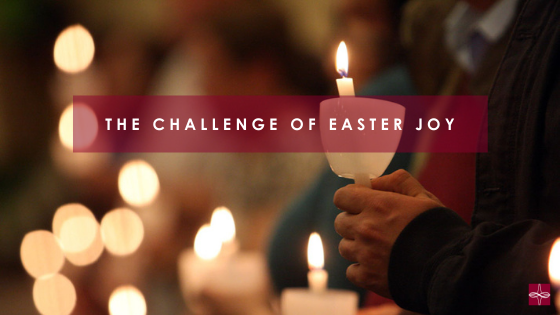

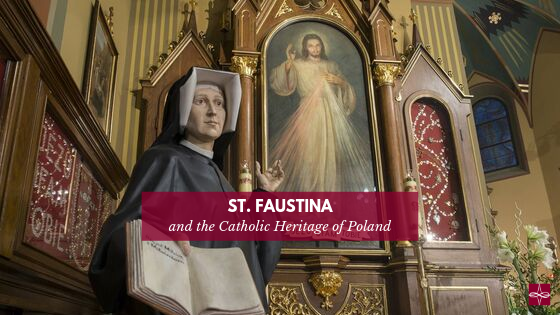

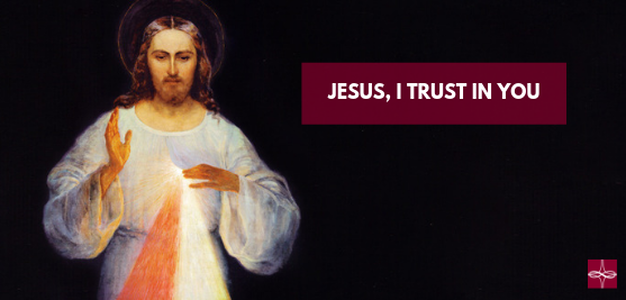

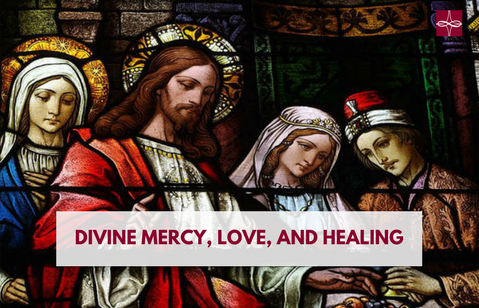

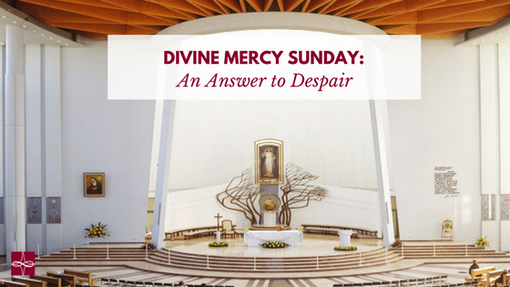

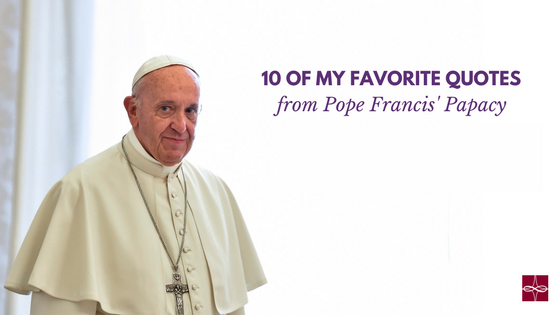

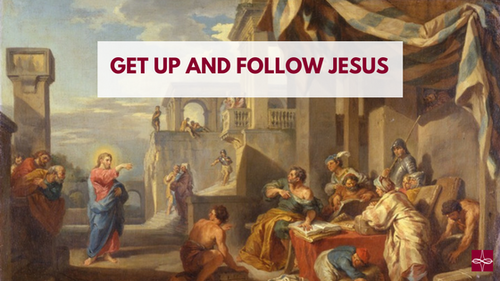

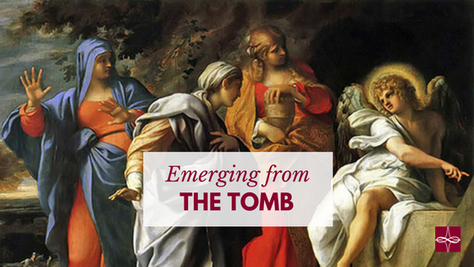

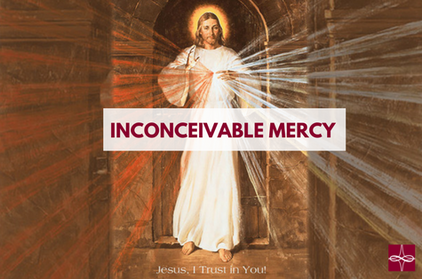

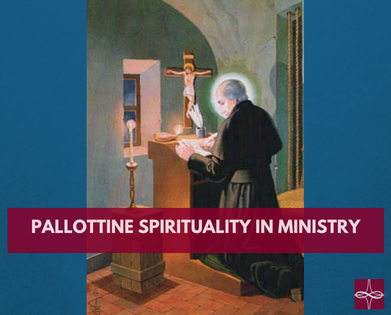

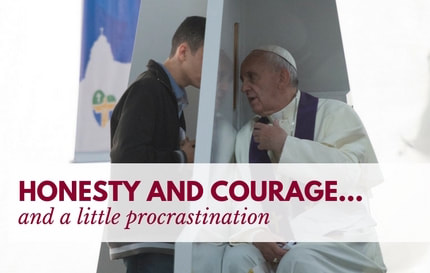

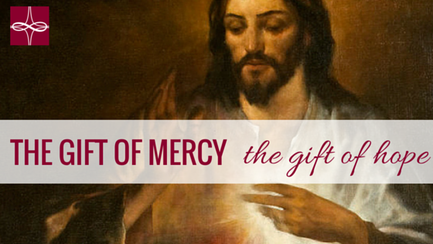

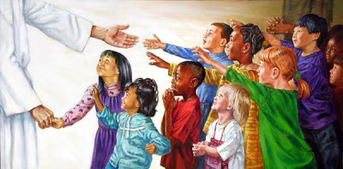
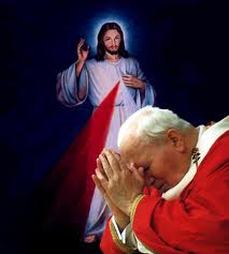
 RSS Feed
RSS Feed